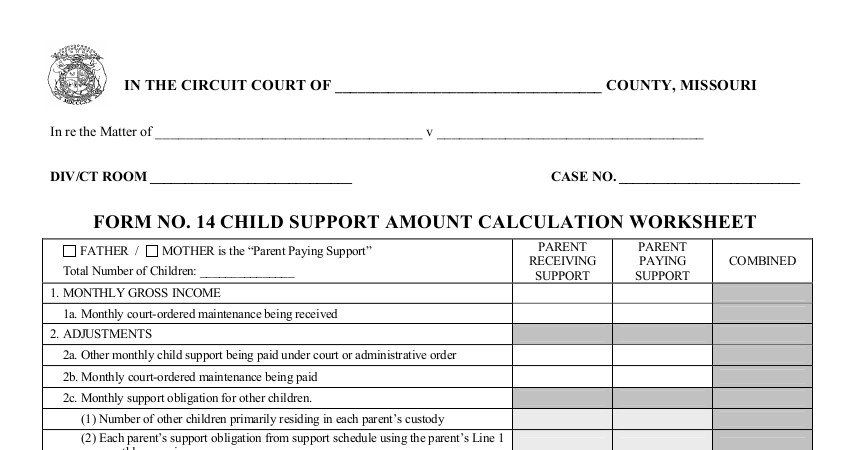Whether you are seeking to establish child support or defend against a support action, we are here to help you achieve a fair resolution.
In Missouri, both parents have an obligation to care for, educate and support their children. After a legal proceeding for dissolution, separation, or paternity has been filed, the Court will determine the appropriate amount of child support to be paid by a party.
Child Support will be the amount of money the Court orders one or both parents to pay each month to help raise their child.
The Court will consider specific Supreme Court guidelines for determining support, and key these considerations into a certain chart (referred to as the Form 14) to calculate a presumed child support amount. Although the Court relies upon these guidelines to determine the appropriate amount of child support, it has the option to find that the Form 14 worksheet is inappropriate for your case, as set forth below in more detail.
What Form 14 Outlines
What Form 14 Outlines
Form 14 is designed to result in an award of child support that provides for the basic necessities of the child. According to Missouri law, child support incorporates financial support for needs such as food, clothing, housing, transportation, and some health care costs. The non-custodial parent may also be responsible for daycare, extracurricular activities, private school expenses, and uninsured medical expenses.
Generally, parents must pay child support until the child is 18. There are some exceptions, however. Child support may continue until the age of 21 if the child enrolls in college or vocational training and meets certain requirements under the statutory guidelines. The child support period could be shorter if the child marries, joins the military, or otherwise becomes self-supporting. On the other hand, a child with a mental or physical incapacity could receive support for as long as necessary.
Determining Income and Child Support Costs
Determining Income and Child Support Costs
Despite the guidance provided by the Form 14, there remains substantial amount of litigation regarding the amount of available income of the parties. During a contested case, the parties will likely be required to provide supporting documents to determine their income. Commonly known as the discovery process, the parties may provide copies of their payroll statements, W-2 forms, tax returns, Statement of Income and Expenses, and other documents to assist the Court in determining income. For child support purposes, gross income generally includes salaries, wages, tips, and commissions, but also pensions and retirement plans. Even without employment, chances are a parent still has income in the form of social security benefits or unemployment compensation. In some instances, determining a parent’s income is not a simple task. When a parent is self-employed, works for cash, or does not represent their income accurately, a party may consider hiring a forensic expert to determine a parent’s true income and expenses.
Once the Court determines each parent’s income, it will take other factors into account to determine an appropriate award of child support. Checkout the list on the right to see a number of these factors.
Some factors used to determine Child Support:
Daycare and healthcare expenses
Uninsured healthcare costs
Any extraordinary needs of the child
The amount of time each parent spends with the child
The number of children in a family
Current child support commitments
Form 14 Deviations
Form 14 Deviations
If your case presents circumstances warranting a deviation from the Form 14, the Court may either add additional support or reduce support amounts below the guidelines. The Court may deviate from the guidelines if one of the following occurs:
(1) The parties stipulate a different amount;
(2) The parent paying child support has income that exceeds the needs of the children;
(3) The parent paying child support has very low-income;
(4) Educational costs or other special needs of the child; and
(5) Travel expenses for visitation.

Family Advocates Law Firm represents clients on both sides of a child support dispute, and can help maximize or minimize the account of child support the Court will award.
Child Support Deviations
Temporary Orders
If your case is pending, child support may be an ongoing dispute between the parties. In this scenario, the Court has discretion to enter temporary orders for the payment of support to ensure the child is cared for during the litigation process. Typically, the Court will hold a hearing to review the factors set forth above and determine an appropriate amount of temporary support.
Modifications
Once a child support order or agreement is in place, the payment amount may be increased or decreased under certain circumstances. According to Missouri law, orders relating to children may be modified or terminated where “substantial and continuing circumstances” justify a change. (Please refer to RSMo. §452.340 and RSMo. §452.370 for detailed information.) There are several different issues that may arise with child support obligations. A parent may not receive enough support to care for their child, or a parent may find that his or her child support obligation is so high that they cannot meet his or her own reasonable needs. Either parent may seek to modify the existing support order in these scenarios. The parents may choose to agree upon an adequate modification, or if the parties are unable to resolve their disagreement, they may litigate the issue before the Court.
Enforcements
In the event a parent does not comply with a child support order, a contempt action may be filed to enforce the order. The Court has a variety of ways to force a party to comply with a valid child support order. If your circumstances present the need for a modification or enforcement of a child support order, it is important to speak to a skilled attorney to ensure you are able to navigate the complex process.


